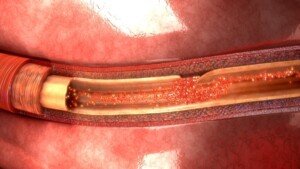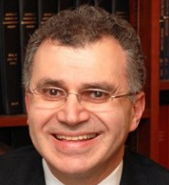
Persistent and especially severe chest pain usually gets people worrying about their heart, but this symptom can also be caused by cancer.
“Chest pain is abnormal and important and must be reported to a doctor,” says Dr. John A. Elefteriades, MD, William W.L. Glenn Professor of Surgery, and Director, Aortic Institute at Yale-New Haven, New Haven, CT.
“As everyone knows, chest pain felt under the breastbone can be a sign of angina or heart attack,” continues Dr. Elefteriades.
“Angina indicates that the heart is receiving inadequate blood flow due to arteries blocked by arteriosclerosis.”
Arteriosclerosis is hardening of the arteries from plaque buildup.
“Angina usually comes on with exertion or emotion. Women and men feel chest pain differently, as shown in the accompanying diagram (to come).
“Chest pain can also indicate an aneurysm of the aorta, the main artery of the body. This pain is usually non-exertional.
“If felt in the front, it indicates involvement of the ascending aorta in the front of the chest.
“If felt in the back (between the shoulder blades), it indicates involvement of the descending aorta in the back of the chest.”
An aneurysm is an abnormal enlargement of a blood vessel; the enlarged area is weak and prone to rupture or dissection — a life-threatening situation that requires immediate surgery.

A tear in the inner lining of the aorta. Shutterstock
“Chest pain can also indicate that there is a lung cancer impinging on or invading the chest wall.”
As the tumor grows, it may spread to nearby structures, including the chest wall, causing discomfort or pain in the chest area.
This type of pain is often persistent and may worsen with movement or breathing.
Additionally, the pain can be accompanied by other symptoms such as persistent cough, weight loss, shortness of breath or blood in the sputum.
Can persistent chest pain have a non-serious cause?
Dr. Elefteriades continues, “Chest pain can also be benign, from inflammation of the costal cartilages, the soft bone that connects the ribs to the breastbone in the front of the chest.”
This is called costochondritis, and athletes who have this have been known to report that the pain is quite severe.
The pain associated with costochondritis, even though it has nothing to do with the heart, is typically sharp or aching and may vary in intensity.
It is often exacerbated by certain movements or pressure on the chest, such as coughing, deep breathing or physical activity.
The discomfort can also be tender to touch in the affected area, which is often found along the upper ribs.
“However, if you are having chest pain, you must report this and have it checked out,” urges Dr. Elefteriades. Especially if it’s persistent.

Formerly the chief of cardiothoracic surgery at Yale University and Yale New-Haven Hospital, Dr. Elefteriades is working on identifying the genetic mutations responsible for thoracic aortic aneurysms. He is the author of over 400 scientific publications on a wide range of cardiac and thoracic topics.
 Lorra Garrick is a former personal trainer certified by the American Council on Exercise. At Bally Total Fitness she trained clients of all ages for fat loss, muscle building, fitness and improved health.
Lorra Garrick is a former personal trainer certified by the American Council on Exercise. At Bally Total Fitness she trained clients of all ages for fat loss, muscle building, fitness and improved health.
.


























